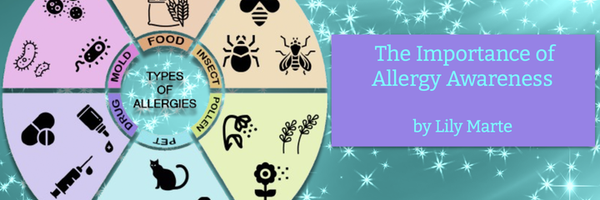Allergy Awerness
Grade 6
Presentation
Problem
I have a severe peanut allergy and lots of other people have allergies so I wanted to see if there is a way to prevent or decrece allergies.
Method
Reserch on the internet.
Interview and question an expert.
Record results.
Research
1. What do you think is the best way to advertise allergy awareness?
2. What can you tell me about the inclusion principles in allergy desensitization? Like who can participate?
3. What can schools do to make environments safer for people with allergies?
4. Are there any common allergy misconceptions that you could clarifie
5. can food allergies be prevented?
6. Does the LEAP study apply to other allergens?
Allergies happen when the immune system reacts to a foreign substance that gets inside the body.
There are lots of different types of reactions. Coming into contact with an allergen through eating, touching or breathing can trigger an immune system response that can cause inflammation in the skin, sinuses, airways, or digestive system.
Allergic reactions can vary greatly from person to person, ranging from mild irritation to a life-threatening emergency known as anaphylaxis.
An antihistamine is an allergy pill that blocks certain cells in the body from receiving histamine. Histamine is a chemical released by the immune system that causes the symptoms of an allergic reaction.
Epinephrine, also known as adrenaline, is both a neurotransmitter and a hormone. It plays an important role in your body’s “fight-or-flight” response. It’s also used as a medication to treat many life-threatening conditions. Which includes anaphylactic reactions to food.
Usually when testing for allergies the allergist, or allergy doctor, will put liquid dots of allergen extracts on your skin and scratch the dots. This is called a puncture or scratch test.
Data
Interview question answers
1. Allergy information doesn't usually get out to the public. It is not a priority for people without food allergies. If a school had a day where you learn about allergies in science class that could help inform people.
2. Different at all clinics. Anyone can but at different times. You have to make sure the immune system is ready. Desensitization works better for younger children. It does not work as well for adults and takes more time.
3. Don't isolate kids at a food allergy table . It feels like punishment for something you can't control. Instead, make sure people are educated about allergies. Wipe down the tables and wash hands. Allergies are not a bad thing. People just need to be educated.
4. Allergies can't be airborne (except fish because the proteins are water soluble). The bigger concern is cross contamination. During an anaphylactic reaction breathing is not the only big concern. Low blood pressure (hypotension) is also very important. When blood pressure is dropping a kids heart will push pressure up until they pass out. Adults' blood pressure will just drop. If a person is only focused on breathing, a kid might pass out due to dropping blood pressure. This is not well known.
5. One theory is that if you have eczema and you absorb that food into your skin you become allergic. But that is not the case. They suspect allergies happen because of the maternal environment. During the third trimester (last three months of pregnancy) or breastfeeding something upsets the mother's immune system. And when the immune system is upset her body releases chemicals called cytokines. Those chemicals go through the placenta into the baby and also through the breast milk. They act like a signal to the baby and say "there is some sort of danger, we need to be ready". So it depends what happens during the pregnancy. Early exposure to allergens helps as well.
6. Yes. Seasonal allergies usually appear after 5 years of age. If the immune system is already agitated by seasonal allergies the response to an allergen in the body will be larger. The immune system also gets more agitated when you have a cold or flu and has a higher chance of a severe allergic reaction.
7. It was specifically done for peanuts. But It can work with other allergies.
The LEAP study (Learning Early About Peanut allergy) showed that early oral introduction of peanuts could help prevent peanut allergies in infants. They tested 640 infant who were considered to be at high risk for peanut allergy. Half were given 6 grams of peanut protein per week. The other half avoided peanuts altogether. At the age of 5 both groups were tested: the results showed that 17.2% of those in the avoidance group had a peanut allergy while only 3.2% in the consumption group. This proves that exposing children to peanuts early in life could have a positive outcome and could result in less kids with severe allergies.
Conclusion
Once I started to research more about allergies in kids I learned about how testing kids for allergies at a young age can have a positive effect on the outcome. I also learned about how allergies work. How our bodies react, and why they react.
I think that people should know this too. I learned so much helpful information and I feel I better understand allergies. I feel this knowledge could benefit others in a meaningful way.
This matters to me because I have lived with allergies my whole life and it is a topic that lots of people don't know about. It's a life threatening condition and that is why I did this project because I know how scary it is. So I want to do my part to inform and educate others.
Citations
https://www.epipen.com/-/media/files/epipen/howtouseepipenautoinjector.pdf
https://www.youtube.com/watch?v=N_dp6qZY-2s&ab_channel=FoodAllergyCanada
https://alexlyttle.com/the-allergist/contact/
https://www.nejm.org/doi/full/10.1056/NEJMoa1414850
https://foodallergycanada.ca/
https://www.mayoclinic.org/
https://youtu.be/9ELxAOgmzmM?si=JU_AJKtBNtKrTb73
Acknowledgement
I would like to thank my mom for inspiering me to work my hardest to get into the CYSF, and for giving me some great advice. I would also like to thank my allergist Dr. Chuck for awsering my questions.

